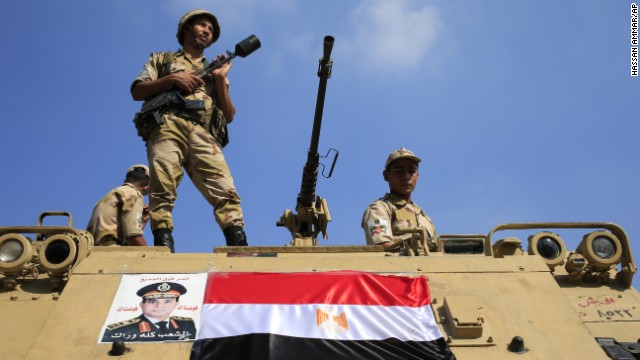 Egyptian soldiers stand guard
atop an armored vehicle on a bridge leading to Cairo's Tahrir Square on Friday,
July 26. The military ousted Mohamed Morsy, Egypt's first democratically elected
president, in early July after days of mass demonstrations.
Egyptian soldiers stand guard
atop an armored vehicle on a bridge leading to Cairo's Tahrir Square on Friday,
July 26. The military ousted Mohamed Morsy, Egypt's first democratically elected
president, in early July after days of mass demonstrations.
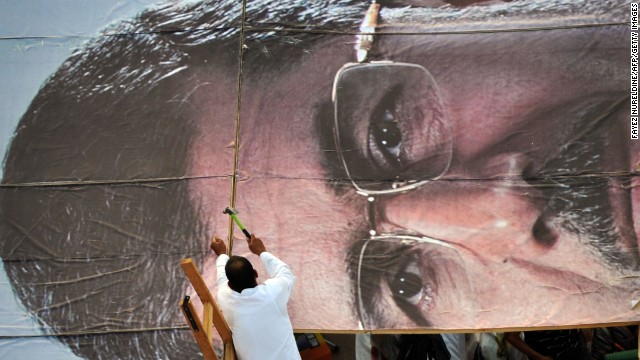 A Morsy
advocate builds a giant portrait of the deposed president Thursday, July 25,
while other supporters hold a sit-in outside a Cairo mosque. The military has
detained Morsy while an interim government takes shape.
A Morsy
advocate builds a giant portrait of the deposed president Thursday, July 25,
while other supporters hold a sit-in outside a Cairo mosque. The military has
detained Morsy while an interim government takes shape.
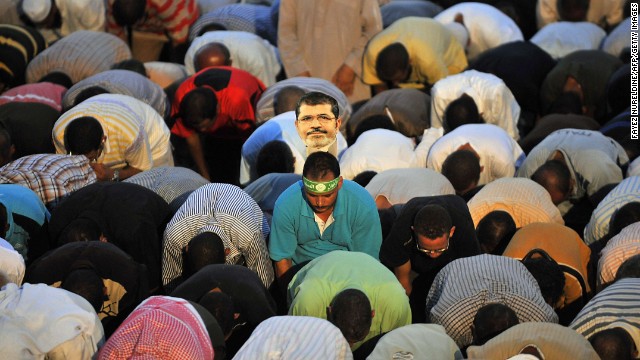 Morsy
supporters say evening prayers during a rally July 25 outside a Cairo
mosque.
Morsy
supporters say evening prayers during a rally July 25 outside a Cairo
mosque.
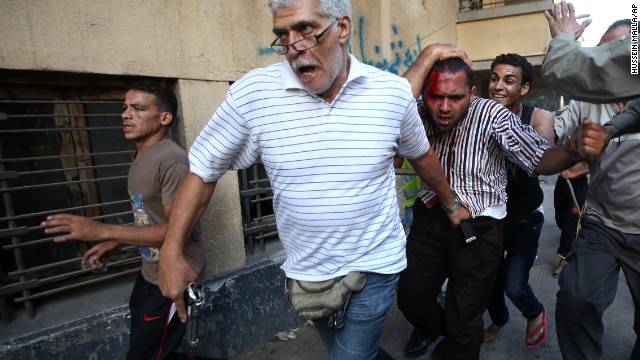 A man
with a pistol, second left, and Morsy opponents detain a suspected Morsy
supporter who was wounded during clashes in Cairo on Monday, July 22. Supporters
and opponents clashed July 22 near the city's Tahrir Square.
A man
with a pistol, second left, and Morsy opponents detain a suspected Morsy
supporter who was wounded during clashes in Cairo on Monday, July 22. Supporters
and opponents clashed July 22 near the city's Tahrir Square.
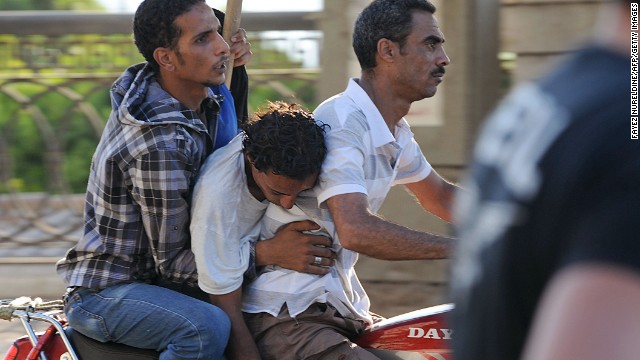 Men
evacuate an injured opponent of Morsy's during clashes with his supporters in
Cairo on July 22.
Men
evacuate an injured opponent of Morsy's during clashes with his supporters in
Cairo on July 22.
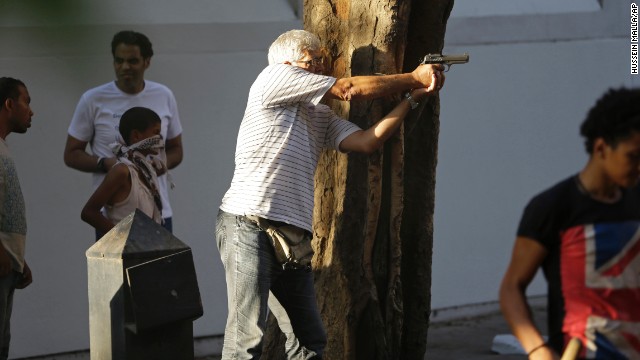 A man
fires a gun during clashes between opponents and supporters of Morsy in Cairo on
July 22.
A man
fires a gun during clashes between opponents and supporters of Morsy in Cairo on
July 22.
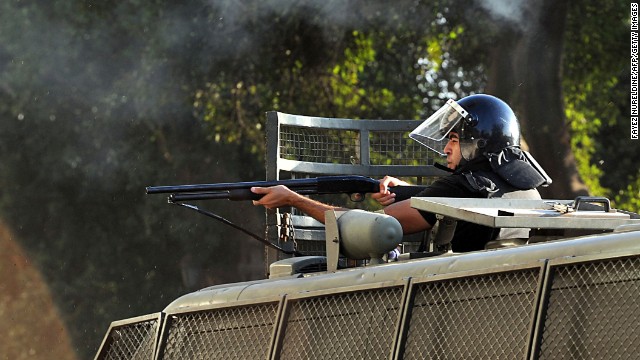 A riot
police officer aims rubber bullets toward Morsy supporters in Cairo on July
22.
A riot
police officer aims rubber bullets toward Morsy supporters in Cairo on July
22.
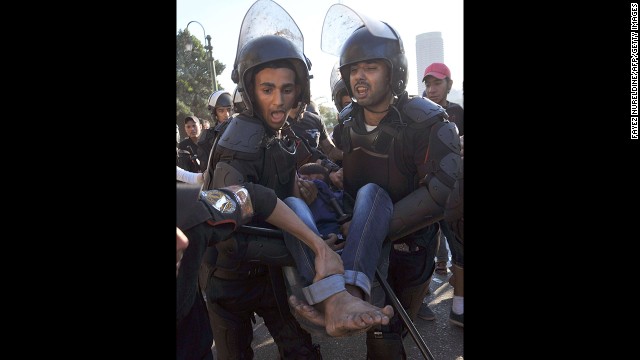 Riot
police evacuate an injured anti-Morsy protester in Cairo on July 22.
Riot
police evacuate an injured anti-Morsy protester in Cairo on July 22.
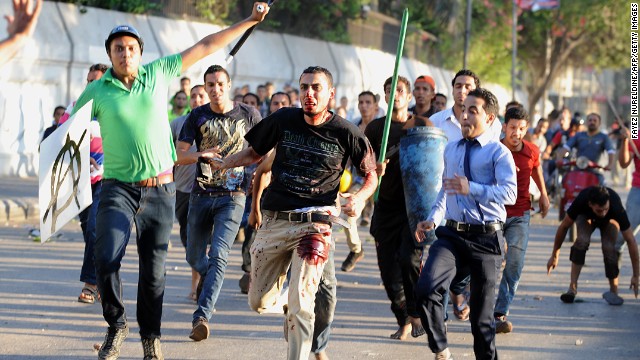 A Morsy
supporter, center, who was allegedly beaten by opponents of Morsy runs during
clashes in Cairo on July 22.
A Morsy
supporter, center, who was allegedly beaten by opponents of Morsy runs during
clashes in Cairo on July 22.
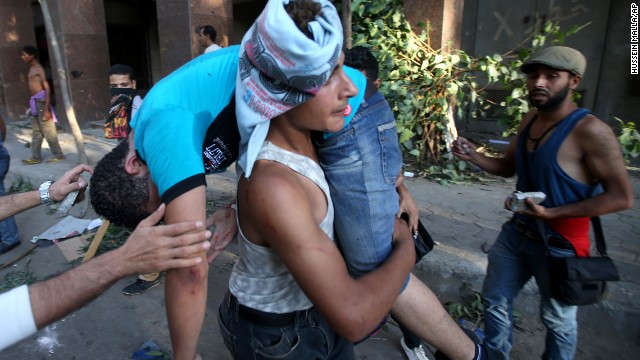 A Morsy
opponent carries his injured friend in Cairo on July 22.
A Morsy
opponent carries his injured friend in Cairo on July 22.
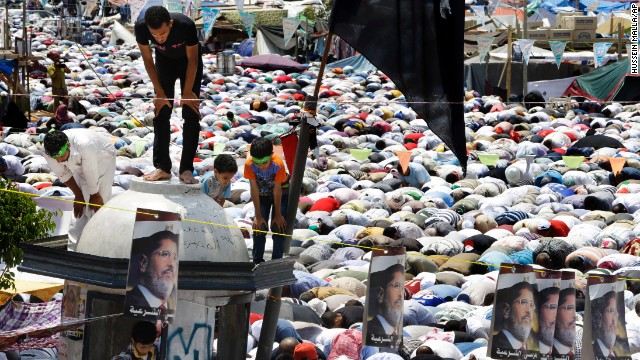 Supporters of Morsy pause for Friday prayers on July 19 at
Nasr City in Cairo, where protesters have installed their camp and held daily
rallies.
Supporters of Morsy pause for Friday prayers on July 19 at
Nasr City in Cairo, where protesters have installed their camp and held daily
rallies.
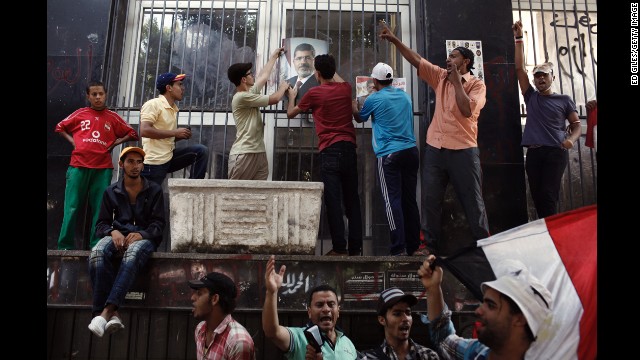 Morsy
supporters take part in a protest march near government ministry buildings on
Wednesday, July 17, in Cairo.
Morsy
supporters take part in a protest march near government ministry buildings on
Wednesday, July 17, in Cairo.
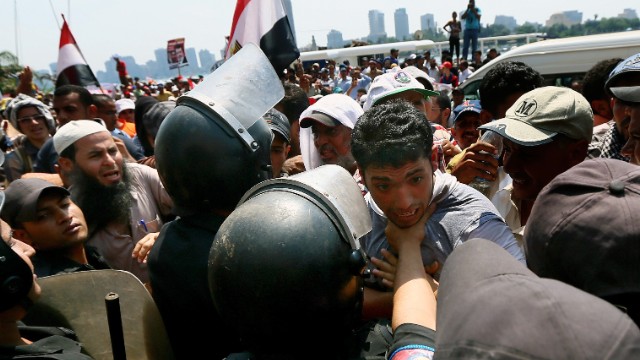 A Morsy
supporter is held back by riot police during a rally near Tahrir Square on July
17.
A Morsy
supporter is held back by riot police during a rally near Tahrir Square on July
17.
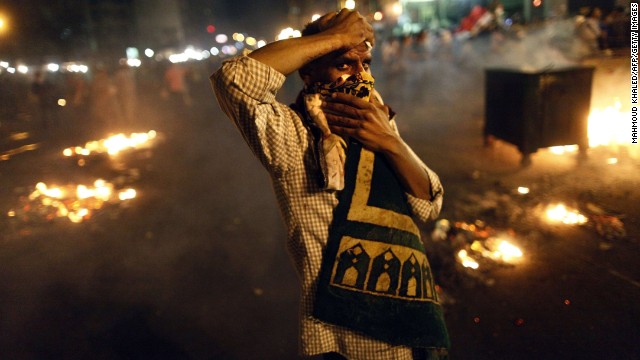 A
supporter of the Muslim Brotherhood and of Morsy covers his mouth under the 6th
October Bridge in Cairo on Tuesday, July 16.
A
supporter of the Muslim Brotherhood and of Morsy covers his mouth under the 6th
October Bridge in Cairo on Tuesday, July 16.
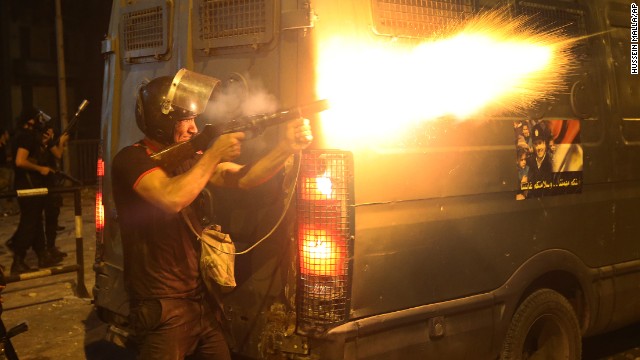 A riot
police officer fires tear gas toward Morsy supporters during clashes in Cairo on
Monday, July 15.
A riot
police officer fires tear gas toward Morsy supporters during clashes in Cairo on
Monday, July 15.
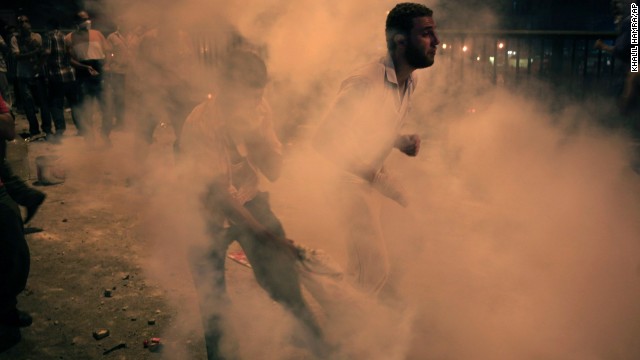 Morsy
supporters run from tear gas in Cairo on July 15.
Morsy
supporters run from tear gas in Cairo on July 15.
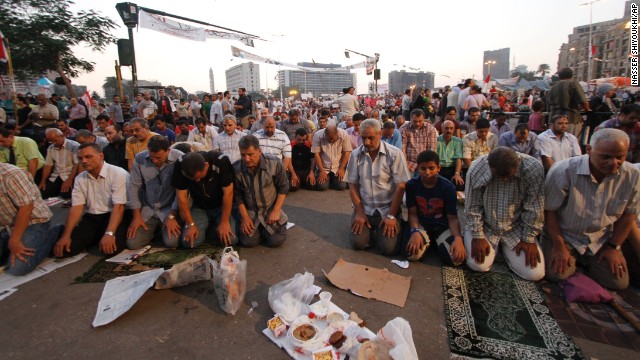 Egyptians in Cairo's Tahrir Square pray before breaking
their fast on the third day of Ramadan, the sacred holy month for Muslims, on
Friday, July 12.
Egyptians in Cairo's Tahrir Square pray before breaking
their fast on the third day of Ramadan, the sacred holy month for Muslims, on
Friday, July 12.
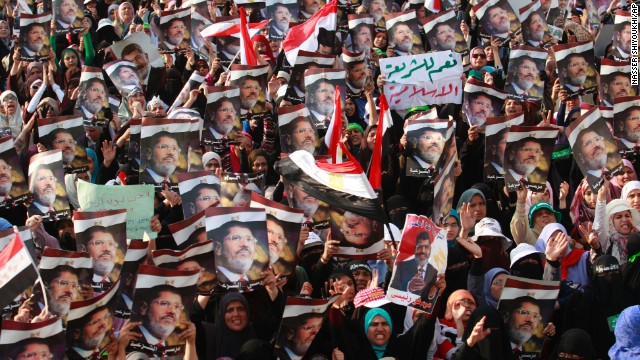 Supporters of the deposed Morsy rally in Nasr City, Egypt,
a suburb of Cairo, on Monday, July 8.
Supporters of the deposed Morsy rally in Nasr City, Egypt,
a suburb of Cairo, on Monday, July 8.
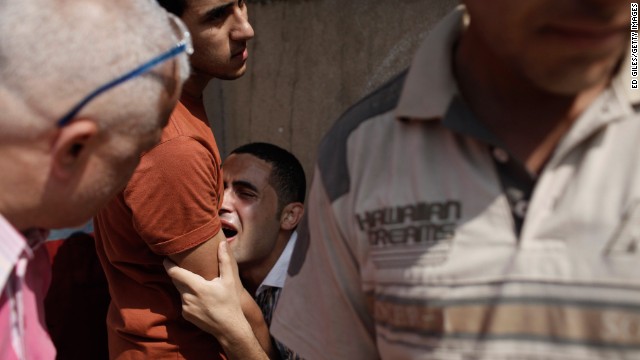 A man
reacts after seeing the body of a family member at the Liltaqmeen al-Sahy
Hospital in Cairo, allegedly killed during a sit-in supporting Morsy in front of
the Republican Guard headquarters on July 8.
A man
reacts after seeing the body of a family member at the Liltaqmeen al-Sahy
Hospital in Cairo, allegedly killed during a sit-in supporting Morsy in front of
the Republican Guard headquarters on July 8.
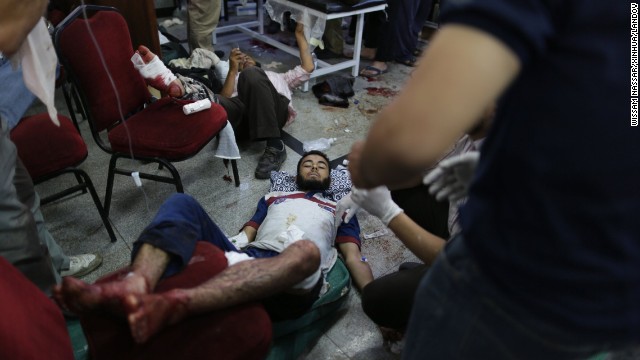 Injured
men receive medical attention after clashes between supporters of Morsy and
security forces in Cairo on July 8.
Injured
men receive medical attention after clashes between supporters of Morsy and
security forces in Cairo on July 8.
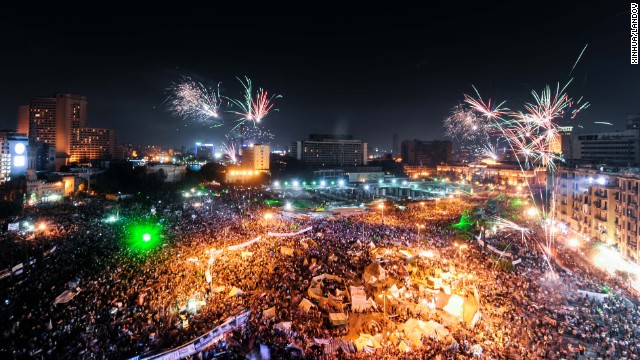 Opponents of Mohamed Morsy gather at Tahrir Square during
a protest in Cairo on Sunday, July 7.
Opponents of Mohamed Morsy gather at Tahrir Square during
a protest in Cairo on Sunday, July 7.
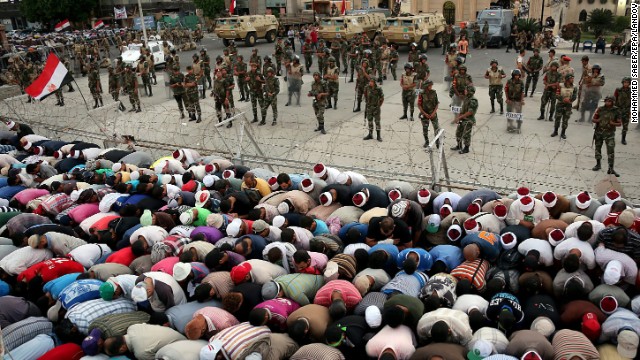 Supporters of Morsy pray next to the headquarters of the
Republican Guards in Cairo on Saturday, July 6, during the funeral of seven
people killed during clashes.
Supporters of Morsy pray next to the headquarters of the
Republican Guards in Cairo on Saturday, July 6, during the funeral of seven
people killed during clashes.
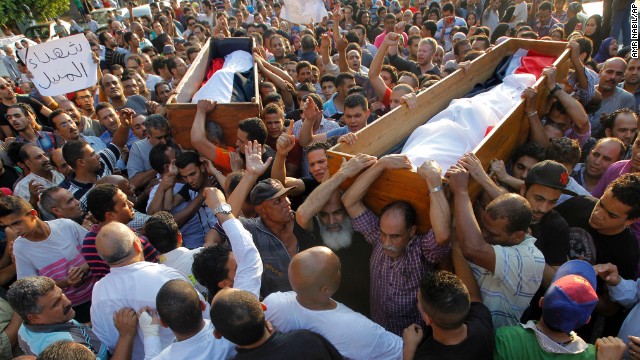 People
carry coffins on July 6 of two Morsy opponents who were killed during clashes in
Cairo.
People
carry coffins on July 6 of two Morsy opponents who were killed during clashes in
Cairo.
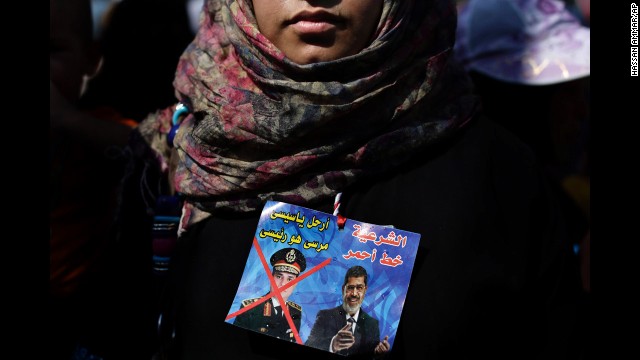 A Morsy
supporter joins protests near the University of Cairo in Giza on July 6.
A Morsy
supporter joins protests near the University of Cairo in Giza on July 6.
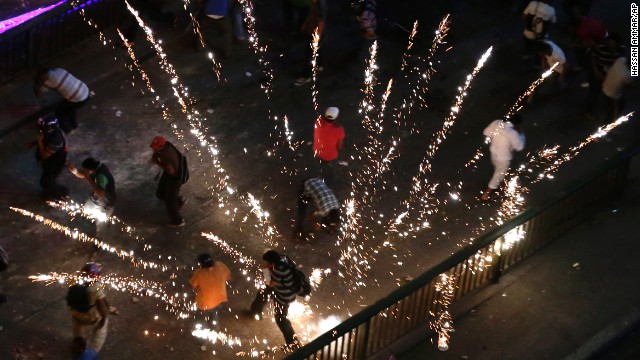 Supporters and opponents of Morsy clash in Cairo on
Friday, July 5.
Supporters and opponents of Morsy clash in Cairo on
Friday, July 5.
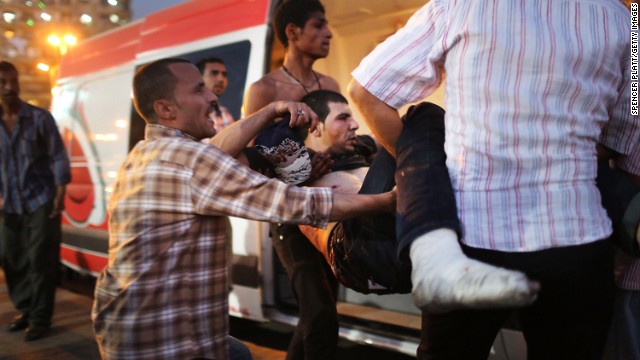 A
protester is attended to in Cairo's Tahrir Square during fighting between the
pro- and anti-Morsy crowds on July 5.
A
protester is attended to in Cairo's Tahrir Square during fighting between the
pro- and anti-Morsy crowds on July 5.
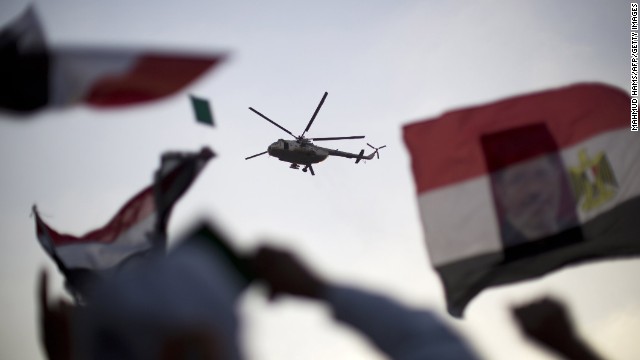 An
Egyptian military helicopter hovers over supporters of the Muslim Brotherhood
and deposed President Mohamed Morsy in Cairo on July 5.
An
Egyptian military helicopter hovers over supporters of the Muslim Brotherhood
and deposed President Mohamed Morsy in Cairo on July 5.
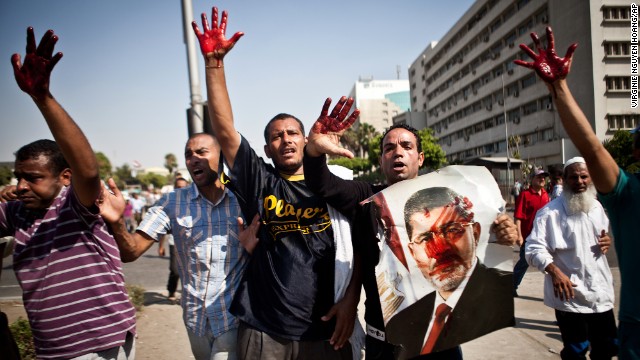 Morsy
supporters hold up their bloodstained hands after Egypt's armed forces opened
fire on rally in front of the Republican Guard headquarters in Cairo on July
5.
Morsy
supporters hold up their bloodstained hands after Egypt's armed forces opened
fire on rally in front of the Republican Guard headquarters in Cairo on July
5.
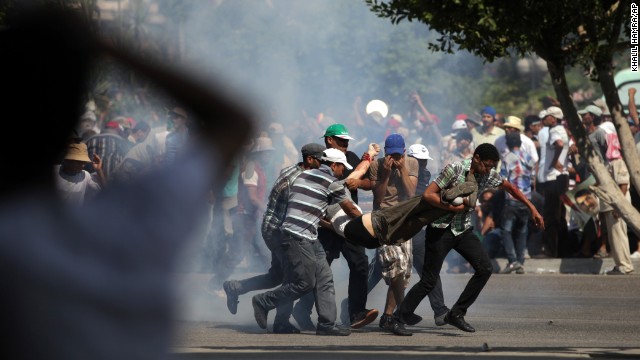 Morsy
supporters carry a man who was shot during clashes next to the Republican Guard
headquarters in Cairo on July 5. State broadcaster Nile TV said a number of
those backing the deposed leader were wounded as they tried to storm the
headquarters, where Morsy reportedly was being held.
Morsy
supporters carry a man who was shot during clashes next to the Republican Guard
headquarters in Cairo on July 5. State broadcaster Nile TV said a number of
those backing the deposed leader were wounded as they tried to storm the
headquarters, where Morsy reportedly was being held.
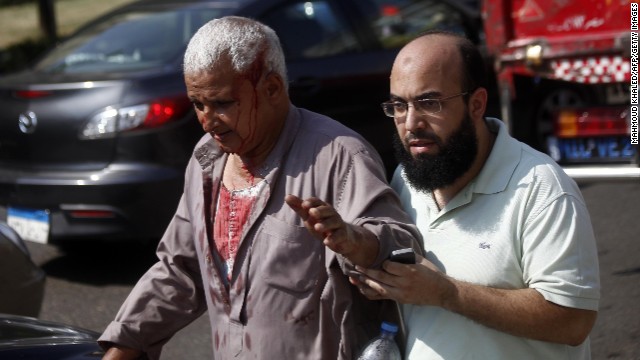 A
wounded man is helped following the gun battle outside the headquarters of the
Republican Guard on July 5.
A
wounded man is helped following the gun battle outside the headquarters of the
Republican Guard on July 5.
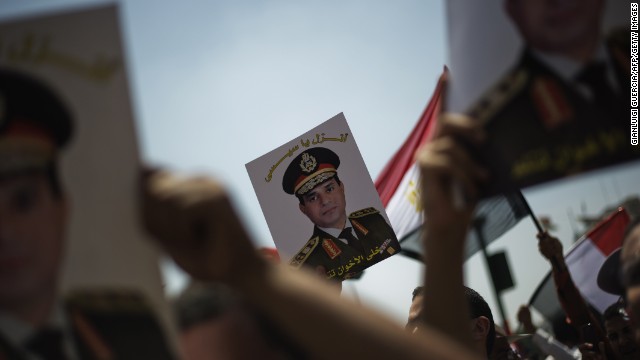 Egyptians hold portraits of Gen. Abdel-Fatah El-Sisi
reading "Come down, Sisi" as they gather in Cairo's landmark Tahrir Square on
July 5.
Egyptians hold portraits of Gen. Abdel-Fatah El-Sisi
reading "Come down, Sisi" as they gather in Cairo's landmark Tahrir Square on
July 5.
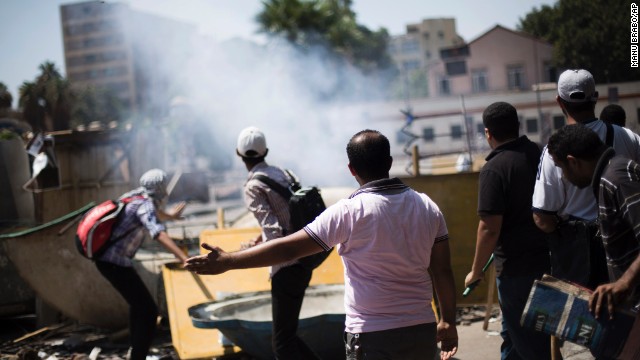 Morsy
supporters react to an explosion during clashes with police officers on July 5
outside Cairo University in Giza.
Morsy
supporters react to an explosion during clashes with police officers on July 5
outside Cairo University in Giza.
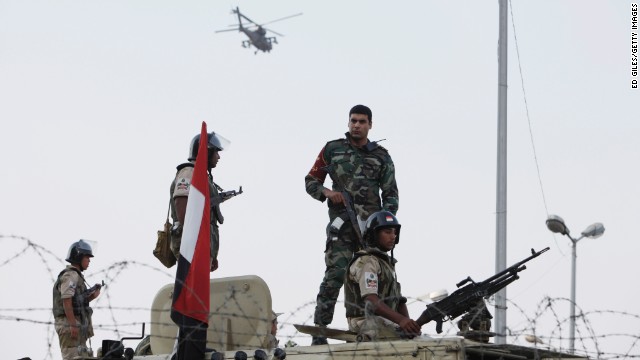 Egyptian
Army soldiers stand guard at the Cairo headquarters of the Republican Guard on
July 5 as an Apache attack helicopter flies overhead.
Egyptian
Army soldiers stand guard at the Cairo headquarters of the Republican Guard on
July 5 as an Apache attack helicopter flies overhead.
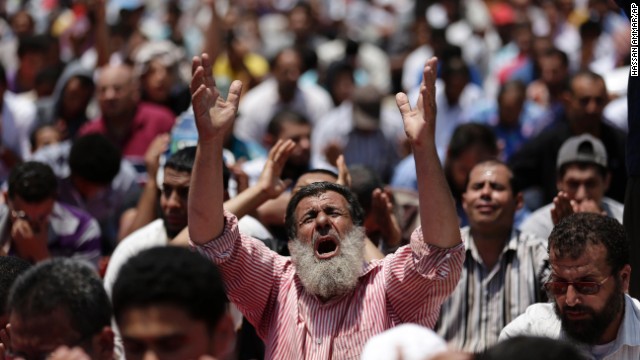 Morsy
supporters pray near the University of Cairo in Giza on July 5.
Morsy
supporters pray near the University of Cairo in Giza on July 5.
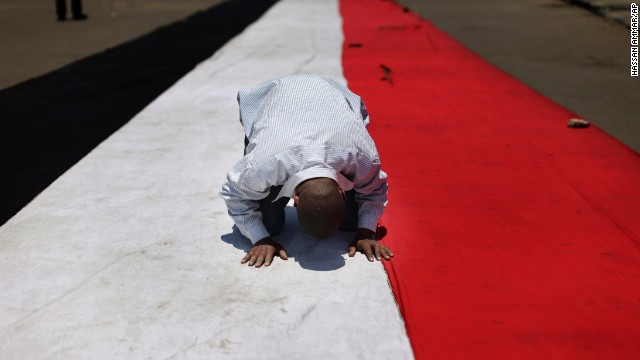 A man
prays on July 5 before the protest near the University of Cairo.
A man
prays on July 5 before the protest near the University of Cairo.
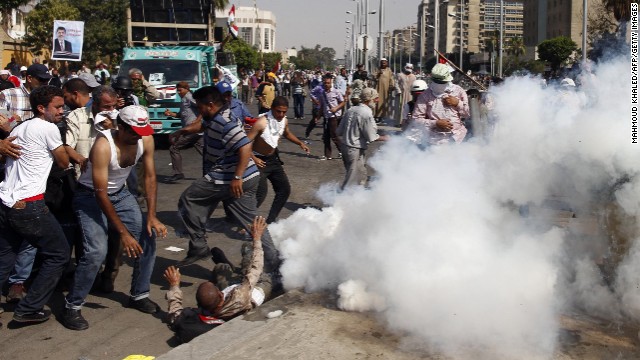 Protesters take cover from tear gas during clashes outside
the headquarters of the Republican Guard in Cairo on July 5.
Protesters take cover from tear gas during clashes outside
the headquarters of the Republican Guard in Cairo on July 5.
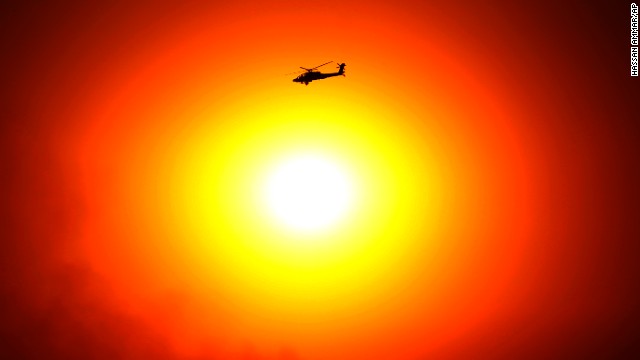 A
military helicopter flies by Egypt's Presidential Palace in Cairo on July
5.
A
military helicopter flies by Egypt's Presidential Palace in Cairo on July
5.
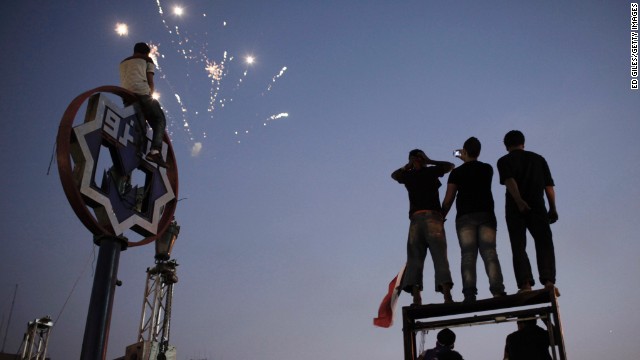 Egyptians watch fireworks in Tahrir Square on Thursday,
July 4, the day after Morsy's ouster.
Egyptians watch fireworks in Tahrir Square on Thursday,
July 4, the day after Morsy's ouster.
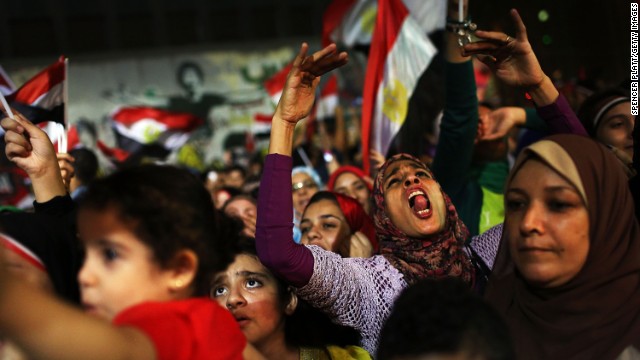 People
dance and cheer in the streets of Cairo on July 4.
People
dance and cheer in the streets of Cairo on July 4.
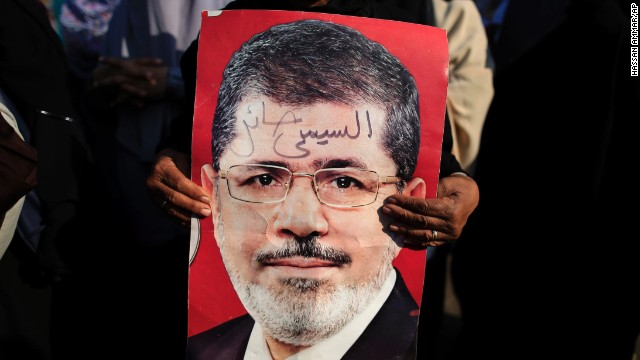 A Morsy
supporter holds a poster of the deposed president during a July 4 rally in Nasr
City.
A Morsy
supporter holds a poster of the deposed president during a July 4 rally in Nasr
City.
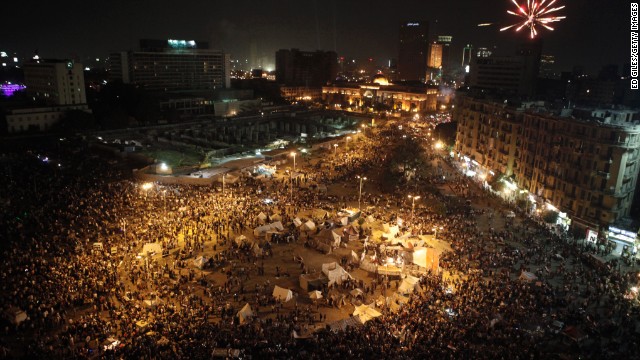 A
massive crowd gathers in Tahrir Square on July 4.
A
massive crowd gathers in Tahrir Square on July 4.
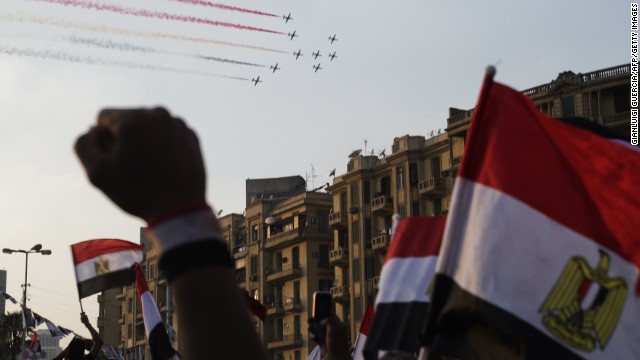 Egyptians cheer and wave national flags as airplanes fly
above Tahrir Square on July 4, leaving a trail of smoke in the colors of the
national flag.
Egyptians cheer and wave national flags as airplanes fly
above Tahrir Square on July 4, leaving a trail of smoke in the colors of the
national flag.
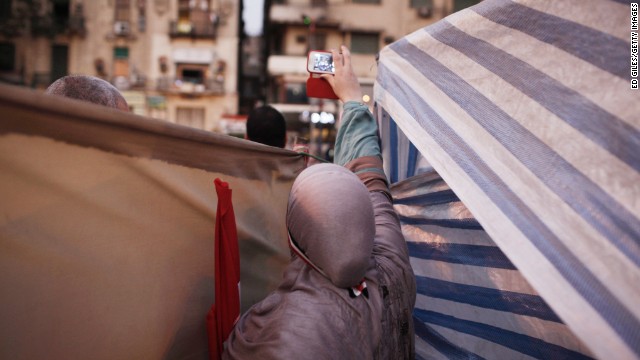 A woman
uses a mobile phone to record the July 4 celebrations in Tahrir Square.
A woman
uses a mobile phone to record the July 4 celebrations in Tahrir Square.
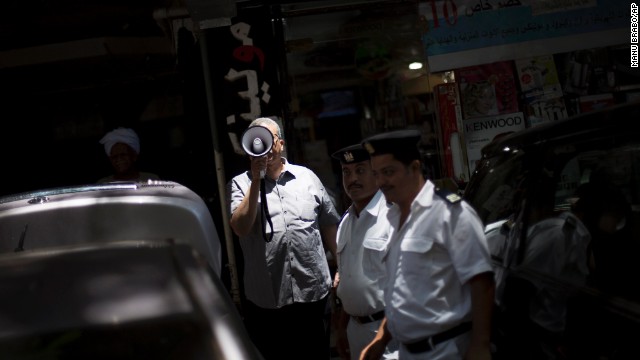 An
opposition protester chants slogans against Morsy near Cairo University, where
Muslim Brotherhood supporters gathered on July 4 to show support for the ousted
president.
An
opposition protester chants slogans against Morsy near Cairo University, where
Muslim Brotherhood supporters gathered on July 4 to show support for the ousted
president.
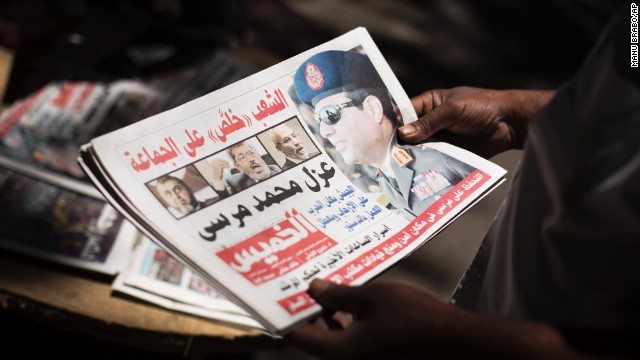 A man
holds a newspaper near Mesaha Square in Cairo on July 4.
A man
holds a newspaper near Mesaha Square in Cairo on July 4.
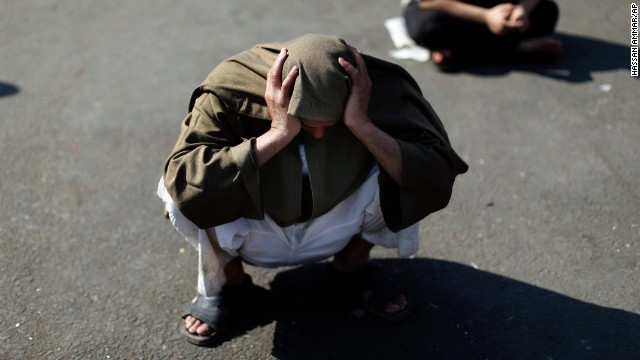 Dejected
Morsy supporters attend a rally in Nasr City on July 4.
Dejected
Morsy supporters attend a rally in Nasr City on July 4.
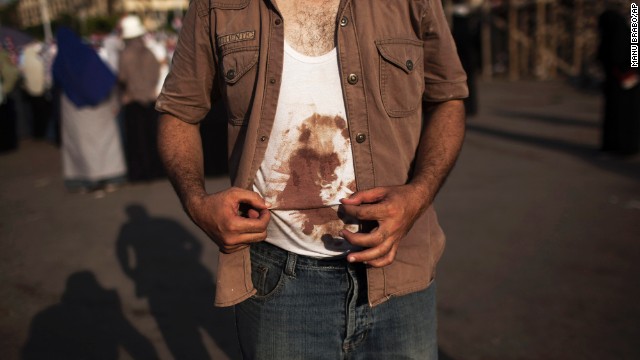 A Morsy
supporter shows his bloodied shirt during a July 4 rally near the University of
Cairo.
A Morsy
supporter shows his bloodied shirt during a July 4 rally near the University of
Cairo.
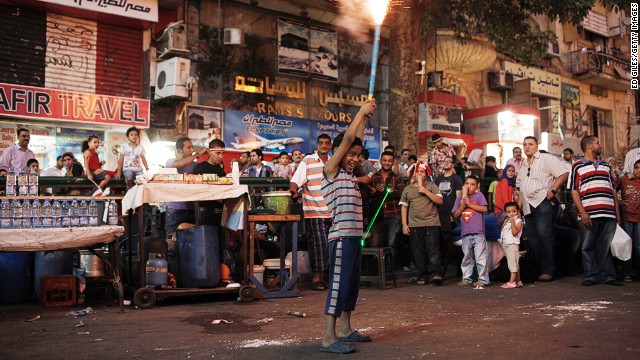 A young
Egyptian boy shoots off fireworks during celebrations in Tahrir Square on July
4.
A young
Egyptian boy shoots off fireworks during celebrations in Tahrir Square on July
4.
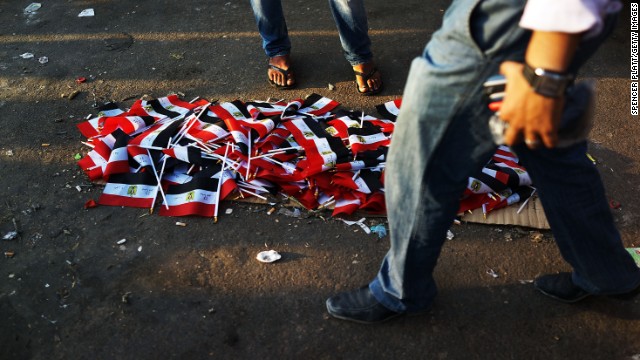 People
walk by a pile of Egyptian flags for sale in Tahrir Square on July 4.
People
walk by a pile of Egyptian flags for sale in Tahrir Square on July 4.
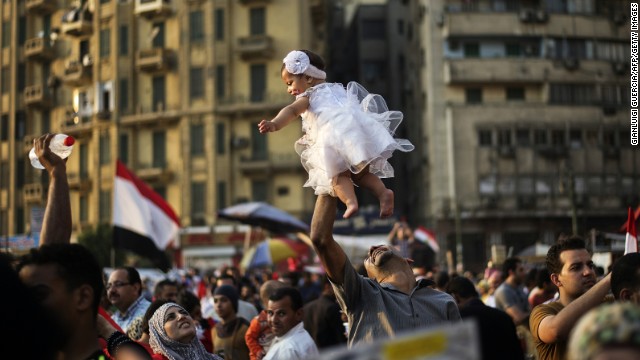 Crowds
throng Tahrir Square on July 4.
Crowds
throng Tahrir Square on July 4.
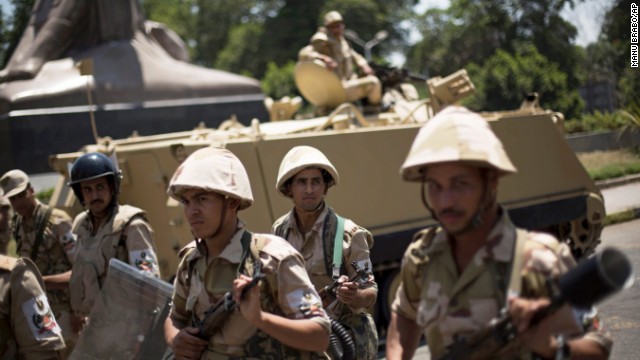 Egyptian
soldiers deploy near Cairo University on July 4.
Egyptian
soldiers deploy near Cairo University on July 4.
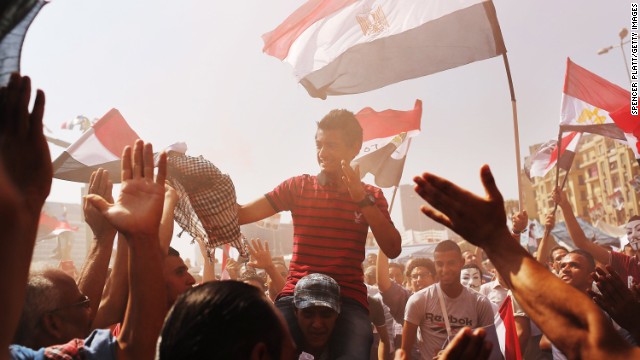 People
dance and cheer at Tahrir Square in Cairo on July 4.
People
dance and cheer at Tahrir Square in Cairo on July 4.
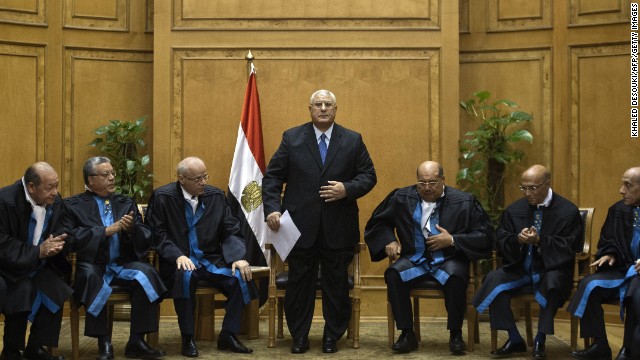 Adly
Mansour, center, stands after delivering a speech during his swearing-in
ceremony as Egypt's interim president in the Supreme Constitutional Court in
Cairo on July 4. Mansour has served as the head of the country's Supreme
Constitutional Court.
Adly
Mansour, center, stands after delivering a speech during his swearing-in
ceremony as Egypt's interim president in the Supreme Constitutional Court in
Cairo on July 4. Mansour has served as the head of the country's Supreme
Constitutional Court.
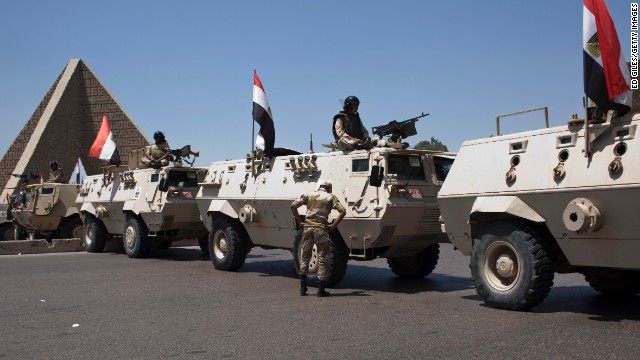 Armored
vehicles with the Egyptian army sit at a checkpoint in the Cairo district of
Nasr City on July 4.
Armored
vehicles with the Egyptian army sit at a checkpoint in the Cairo district of
Nasr City on July 4.
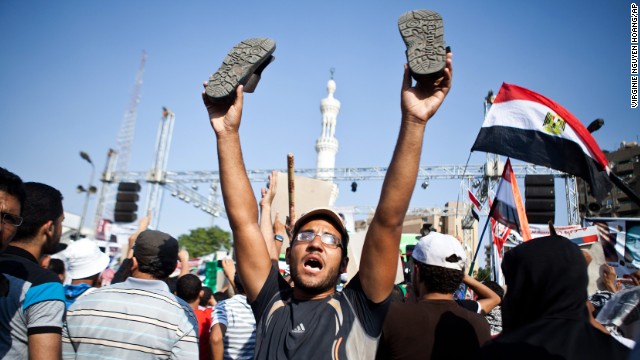 A Morsy
supporter reacts as a military helicopter flies over during a July 4 rally in
Nasr City.
A Morsy
supporter reacts as a military helicopter flies over during a July 4 rally in
Nasr City.
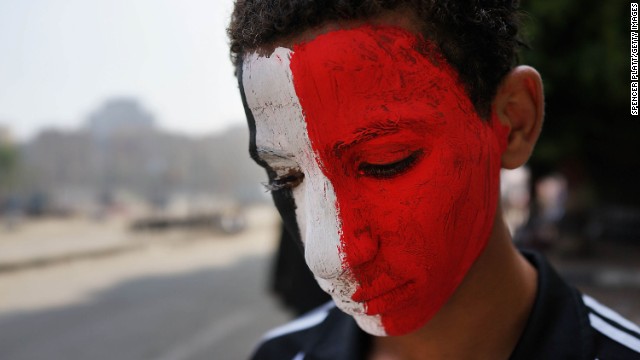 A boy
with face paint the color of the Egyptian flag pauses on July 4 in Tahrir
Square.
A boy
with face paint the color of the Egyptian flag pauses on July 4 in Tahrir
Square.
 A
pedestrian shakes hands with a member of the military at a roadblock in
Giza.
A
pedestrian shakes hands with a member of the military at a roadblock in
Giza.
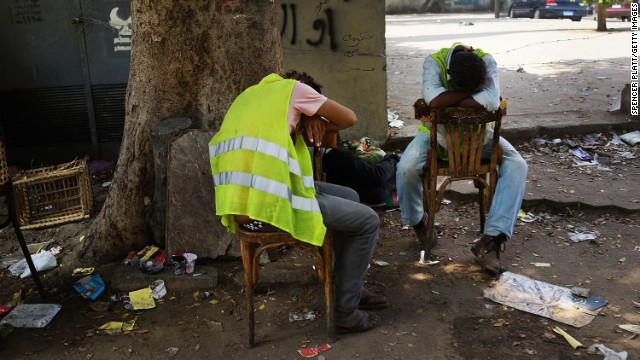 Security
personnel rest on July 4 in Tahrir Square.
Security
personnel rest on July 4 in Tahrir Square.
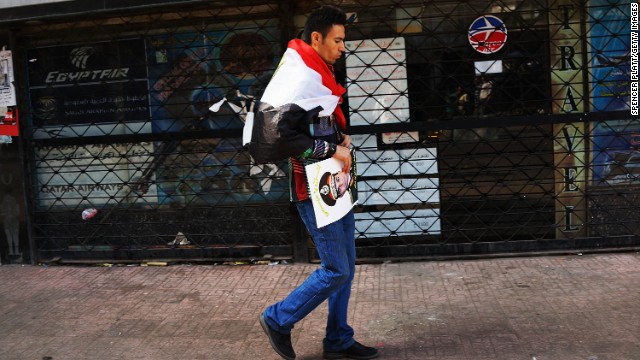 A man
walks to Tahrir Square on July 4.
A man
walks to Tahrir Square on July 4.
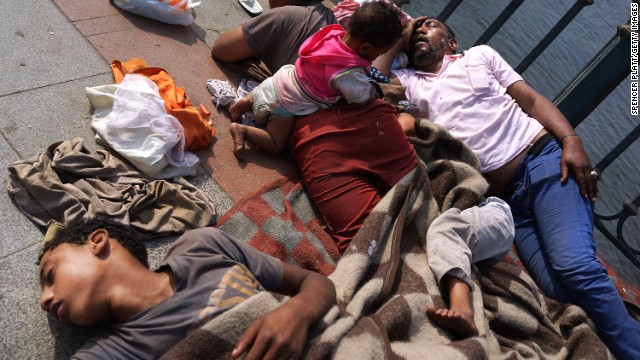 A family
sleeps on a bridge near Tahrir Square on July 4.
A family
sleeps on a bridge near Tahrir Square on July 4.
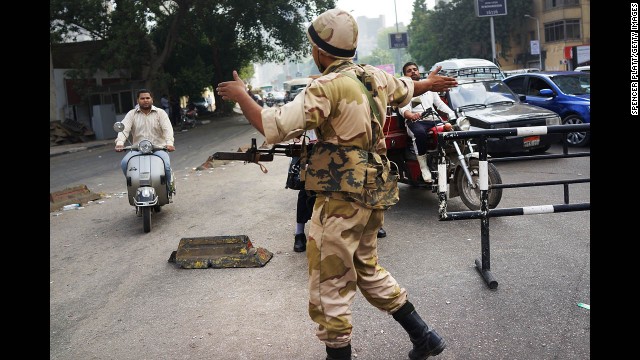 A member
of the Egyptian military redirects traffic on July 4 at a roadblock in
Giza.
A member
of the Egyptian military redirects traffic on July 4 at a roadblock in
Giza.
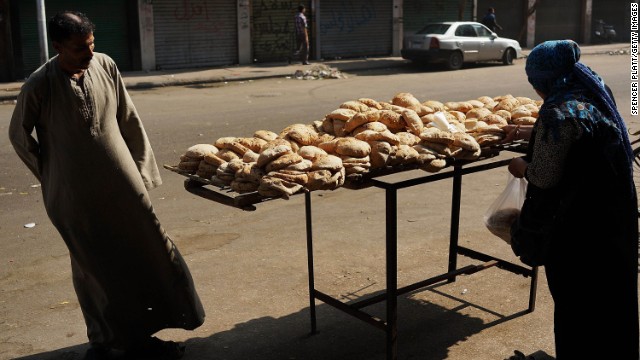 Bread is
sold near Tahrir Square on July 4.
Bread is
sold near Tahrir Square on July 4.
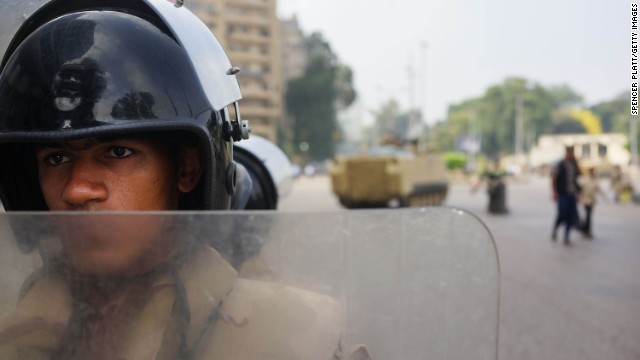 An
Egyptian military member guards a roadblock in Giza on July 4.
An
Egyptian military member guards a roadblock in Giza on July 4. Massive, rival rallies in and around Cairo
ran into the wee hours of Saturday, with one group celebrating the ouster and
jailing of once Egyptian
President Mohamed Morsy and others angrily demanding the democratically
elected leader's return.
These demonstrations around the
capital -- and in fact all around the tumultuous nation -- showed the raw
emotion and deep divisions tied to Morsy, political battles that have rocked a
country already dealing with major economic and other challenges.
The mass events occasionally have
turned violent in recent weeks, either with clashes between competing factions
or between protesters and security forces.
It happened Friday as well, when
five people were killed and 72 injured in the port city of Alexandria, the
state-run Middle East News Agency reported, citing security sources.
Scores of seemingly injured
protesters also rushed late Friday around Nasr City, an area not far from
central Cairo where Morsy backers were staging a large rally, according to a CNN
crew at the scene.
As the effects of tear gas wafted
through the air, witnesses reported that some had been hurt in clashes with
security forces around the 6th of October bridge over the Nile River.
A very different scene played out
not far across that bridge in Tahrir Square, which was the hub of the popular
movement that led to the military's ouster of another president -- Hosni Mubark,
who'd ruled Egypt for nearly three decades -- in early 2011.
There, again and again, fireworks
lit up the nighttime sky. Those gathered below, opposed to Morsy, cheered
military helicopters that flew by, sometimes dropping leaflets and Egyptian
flags.
Morsy, and how he'd steered
Egypt's government, was foremost on the minds of people on both sides of the
fight.
The former Muslim Brotherhood
leader became Egypt's first democratically president in June 2012, but found
himself at odds with the opposition before the military removed him from power,
and held him, early this month.
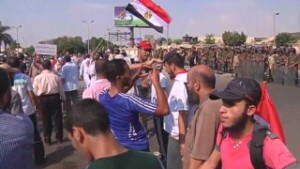 More protest expected in
Egypt
More protest expected in
Egypt
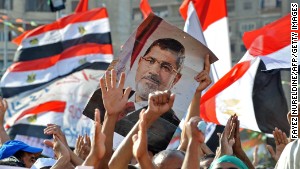 Middle East stories that
matter
Middle East stories that
matter
On Friday, Morsy found himself
under fire again -- not for actions he took as president, but before
then.
Because of these allegations, a
judge ordered the former president jailed for 15 days, according to state
media.
Morsy
a victim of Egypt's revolution of the mind
Prosecutor: Morsy
collaborated with Hamas
Immediately after the coup, a
prosecutor opened an investigation into claims Morsy and top leaders of the
Muslim Brotherhood -- the Islamist group that was banned under Mubarak but
became Egypt's most powerful political force after his fall -- had incited
violence and the killing of protesters.
The charges revealed Friday,
though, stem from a jailbreak from Wadi-Natroun prison in the days after Egypt's
2011 revolution.
Nineteen Brotherhood members,
including Morsy, are accused of having escaped, state-run EGYNews reported.
The prosecutors who ordered the
probe two weeks ago said the escape was plotted by "foreign elements" including
Hamas, its military wing, the Islamic Palestinian Army and Hezbollah. The Muslim
Brotherhood was named as a domestic group that cooperated with those who broke
them out of prison.
Morsy will be questioned about
whether he collaborated with Hamas about the prison break and about attacks on
police stations, the government-run Ahram Online reported.
He is accused of not merely
escaping, but destroying the prison's official records as well as intentionally
killing and abducting police officers and prisoners.
Local media reports at the time
stated that Morsy was in prison for a single day.
According to the Al-Masri
Al-Youm newspaper, Morsy was among 500 members of the Muslim Brotherhood who
were arrested after planning to join anti-Mubarak demonstrations. Allegedly,
there were no formal charges against them.
The same newspaper wrote about
the jailbreak that happened the next day. It quoted a Brotherhood leader saying
that they didn't escape from prison, but were freed by family members after the
warden and guards fled as the revolution unfolded.
Political divisions run
deep in volatile country
The military has not commented
on Morsy's whereabouts. When he was first detained, a Brotherhood spokesman told
CNN that the deposed leader was initially under house arrest at the presidential
Republican Guard headquarters in Cairo and later moved to the Defense
Ministry.
He's not the first of his allies
jailed since the coup. So, too, have eight leading me
mbers of the Freedom and
Justice Party -- the Brotherhood's political arm -- arrests that party officials
have decried as illegal and politically motivated.
Human rights organizations have
offered similar views. And U.N. Secretary-General Ban Ki-moon is among the world
leaders who have called for Morsy and other detained leaders to be immediately
released "or (to) have their cases reviewed transparently without delay."
This political standoff comes as
Egypt deals with a long struggling economy and additional security
challenges.
In the volatile region of Sinai,
for instance, armed men attacked a military checkpoint and police station in the
town of Sheikh Zweid, resident Ahmed Abu Eita said. At least one armored
military vehicle was hit by a rocket-propelled grenade, he said.
"We can't leave home ... We
don't know who is firing at who," Eita said. "The ambulances can't even move to
get the injured."
He and others said the upheaval
in Cairo has hurt efforts to fight terrorism and bring peace to his region,
where violence has long been a problem and has increased since Morsy's
ouster.
Egypt seemingly has been
teetering for years, and there has been little indication of late those
festering tensions will calm anytime soon.
Speaking on CNN, Muslim
Brotherhood spokeswoman Mona al Qazzaz accused the military and opposition of,
together, "killing the biggest democracy in the Middle East."
"The military stepped in, and
the opposition that failed to win through the ballot boxes came on the back of
the tanks," she said.
Yet opposition activists, such
as June 30 Front spokesman Ahmed Hawary, said Morsy left the military little
choice but to intervene. Yes, he was democratically elected, but he didn't give
those opposed to him any way to check and challenge what he was doing, according
to Hawary.
"Democracy is due political
process," he told CNN. "But there has never been a due political process (under
Morsy)."
 More protest expected in
Egypt
More protest expected in
Egypt  Middle East stories that
matter
Middle East stories that
matter 
 Egyptian soldiers stand guard
atop an armored vehicle on a bridge leading to Cairo's Tahrir Square on Friday,
July 26. The military ousted Mohamed Morsy, Egypt's first democratically elected
president, in early July after days of mass demonstrations.
Egyptian soldiers stand guard
atop an armored vehicle on a bridge leading to Cairo's Tahrir Square on Friday,
July 26. The military ousted Mohamed Morsy, Egypt's first democratically elected
president, in early July after days of mass demonstrations.
 A Morsy
advocate builds a giant portrait of the deposed president Thursday, July 25,
while other supporters hold a sit-in outside a Cairo mosque. The military has
detained Morsy while an interim government takes shape.
A Morsy
advocate builds a giant portrait of the deposed president Thursday, July 25,
while other supporters hold a sit-in outside a Cairo mosque. The military has
detained Morsy while an interim government takes shape.
 Morsy
supporters say evening prayers during a rally July 25 outside a Cairo
mosque.
Morsy
supporters say evening prayers during a rally July 25 outside a Cairo
mosque.
 A man
with a pistol, second left, and Morsy opponents detain a suspected Morsy
supporter who was wounded during clashes in Cairo on Monday, July 22. Supporters
and opponents clashed July 22 near the city's Tahrir Square.
A man
with a pistol, second left, and Morsy opponents detain a suspected Morsy
supporter who was wounded during clashes in Cairo on Monday, July 22. Supporters
and opponents clashed July 22 near the city's Tahrir Square.
 Men
evacuate an injured opponent of Morsy's during clashes with his supporters in
Cairo on July 22.
Men
evacuate an injured opponent of Morsy's during clashes with his supporters in
Cairo on July 22.
 A man
fires a gun during clashes between opponents and supporters of Morsy in Cairo on
July 22.
A man
fires a gun during clashes between opponents and supporters of Morsy in Cairo on
July 22.
 A riot
police officer aims rubber bullets toward Morsy supporters in Cairo on July
22.
A riot
police officer aims rubber bullets toward Morsy supporters in Cairo on July
22.
 Riot
police evacuate an injured anti-Morsy protester in Cairo on July 22.
Riot
police evacuate an injured anti-Morsy protester in Cairo on July 22.
 A Morsy
supporter, center, who was allegedly beaten by opponents of Morsy runs during
clashes in Cairo on July 22.
A Morsy
supporter, center, who was allegedly beaten by opponents of Morsy runs during
clashes in Cairo on July 22.
 A Morsy
opponent carries his injured friend in Cairo on July 22.
A Morsy
opponent carries his injured friend in Cairo on July 22.
 Supporters of Morsy pause for Friday prayers on July 19 at
Nasr City in Cairo, where protesters have installed their camp and held daily
rallies.
Supporters of Morsy pause for Friday prayers on July 19 at
Nasr City in Cairo, where protesters have installed their camp and held daily
rallies.
 Morsy
supporters take part in a protest march near government ministry buildings on
Wednesday, July 17, in Cairo.
Morsy
supporters take part in a protest march near government ministry buildings on
Wednesday, July 17, in Cairo.
 A Morsy
supporter is held back by riot police during a rally near Tahrir Square on July
17.
A Morsy
supporter is held back by riot police during a rally near Tahrir Square on July
17.
 A
supporter of the Muslim Brotherhood and of Morsy covers his mouth under the 6th
October Bridge in Cairo on Tuesday, July 16.
A
supporter of the Muslim Brotherhood and of Morsy covers his mouth under the 6th
October Bridge in Cairo on Tuesday, July 16.
 A riot
police officer fires tear gas toward Morsy supporters during clashes in Cairo on
Monday, July 15.
A riot
police officer fires tear gas toward Morsy supporters during clashes in Cairo on
Monday, July 15.
 Morsy
supporters run from tear gas in Cairo on July 15.
Morsy
supporters run from tear gas in Cairo on July 15.
 Egyptians in Cairo's Tahrir Square pray before breaking
their fast on the third day of Ramadan, the sacred holy month for Muslims, on
Friday, July 12.
Egyptians in Cairo's Tahrir Square pray before breaking
their fast on the third day of Ramadan, the sacred holy month for Muslims, on
Friday, July 12.
 Supporters of the deposed Morsy rally in Nasr City, Egypt,
a suburb of Cairo, on Monday, July 8.
Supporters of the deposed Morsy rally in Nasr City, Egypt,
a suburb of Cairo, on Monday, July 8.
 A man
reacts after seeing the body of a family member at the Liltaqmeen al-Sahy
Hospital in Cairo, allegedly killed during a sit-in supporting Morsy in front of
the Republican Guard headquarters on July 8.
A man
reacts after seeing the body of a family member at the Liltaqmeen al-Sahy
Hospital in Cairo, allegedly killed during a sit-in supporting Morsy in front of
the Republican Guard headquarters on July 8.
 Injured
men receive medical attention after clashes between supporters of Morsy and
security forces in Cairo on July 8.
Injured
men receive medical attention after clashes between supporters of Morsy and
security forces in Cairo on July 8.
 Opponents of Mohamed Morsy gather at Tahrir Square during
a protest in Cairo on Sunday, July 7.
Opponents of Mohamed Morsy gather at Tahrir Square during
a protest in Cairo on Sunday, July 7.
 Supporters of Morsy pray next to the headquarters of the
Republican Guards in Cairo on Saturday, July 6, during the funeral of seven
people killed during clashes.
Supporters of Morsy pray next to the headquarters of the
Republican Guards in Cairo on Saturday, July 6, during the funeral of seven
people killed during clashes.
 People
carry coffins on July 6 of two Morsy opponents who were killed during clashes in
Cairo.
People
carry coffins on July 6 of two Morsy opponents who were killed during clashes in
Cairo.
 A Morsy
supporter joins protests near the University of Cairo in Giza on July 6.
A Morsy
supporter joins protests near the University of Cairo in Giza on July 6.
 Supporters and opponents of Morsy clash in Cairo on
Friday, July 5.
Supporters and opponents of Morsy clash in Cairo on
Friday, July 5.
 A
protester is attended to in Cairo's Tahrir Square during fighting between the
pro- and anti-Morsy crowds on July 5.
A
protester is attended to in Cairo's Tahrir Square during fighting between the
pro- and anti-Morsy crowds on July 5.
 An
Egyptian military helicopter hovers over supporters of the Muslim Brotherhood
and deposed President Mohamed Morsy in Cairo on July 5.
An
Egyptian military helicopter hovers over supporters of the Muslim Brotherhood
and deposed President Mohamed Morsy in Cairo on July 5.
 Morsy
supporters hold up their bloodstained hands after Egypt's armed forces opened
fire on rally in front of the Republican Guard headquarters in Cairo on July
5.
Morsy
supporters hold up their bloodstained hands after Egypt's armed forces opened
fire on rally in front of the Republican Guard headquarters in Cairo on July
5.
 Morsy
supporters carry a man who was shot during clashes next to the Republican Guard
headquarters in Cairo on July 5. State broadcaster Nile TV said a number of
those backing the deposed leader were wounded as they tried to storm the
headquarters, where Morsy reportedly was being held.
Morsy
supporters carry a man who was shot during clashes next to the Republican Guard
headquarters in Cairo on July 5. State broadcaster Nile TV said a number of
those backing the deposed leader were wounded as they tried to storm the
headquarters, where Morsy reportedly was being held.
 A
wounded man is helped following the gun battle outside the headquarters of the
Republican Guard on July 5.
A
wounded man is helped following the gun battle outside the headquarters of the
Republican Guard on July 5.
 Egyptians hold portraits of Gen. Abdel-Fatah El-Sisi
reading "Come down, Sisi" as they gather in Cairo's landmark Tahrir Square on
July 5.
Egyptians hold portraits of Gen. Abdel-Fatah El-Sisi
reading "Come down, Sisi" as they gather in Cairo's landmark Tahrir Square on
July 5.
 Morsy
supporters react to an explosion during clashes with police officers on July 5
outside Cairo University in Giza.
Morsy
supporters react to an explosion during clashes with police officers on July 5
outside Cairo University in Giza.
 Egyptian
Army soldiers stand guard at the Cairo headquarters of the Republican Guard on
July 5 as an Apache attack helicopter flies overhead.
Egyptian
Army soldiers stand guard at the Cairo headquarters of the Republican Guard on
July 5 as an Apache attack helicopter flies overhead.
 Morsy
supporters pray near the University of Cairo in Giza on July 5.
Morsy
supporters pray near the University of Cairo in Giza on July 5.
 A man
prays on July 5 before the protest near the University of Cairo.
A man
prays on July 5 before the protest near the University of Cairo.
 Protesters take cover from tear gas during clashes outside
the headquarters of the Republican Guard in Cairo on July 5.
Protesters take cover from tear gas during clashes outside
the headquarters of the Republican Guard in Cairo on July 5.
 A
military helicopter flies by Egypt's Presidential Palace in Cairo on July
5.
A
military helicopter flies by Egypt's Presidential Palace in Cairo on July
5.
 Egyptians watch fireworks in Tahrir Square on Thursday,
July 4, the day after Morsy's ouster.
Egyptians watch fireworks in Tahrir Square on Thursday,
July 4, the day after Morsy's ouster.
 People
dance and cheer in the streets of Cairo on July 4.
People
dance and cheer in the streets of Cairo on July 4.
 A Morsy
supporter holds a poster of the deposed president during a July 4 rally in Nasr
City.
A Morsy
supporter holds a poster of the deposed president during a July 4 rally in Nasr
City.
 A
massive crowd gathers in Tahrir Square on July 4.
A
massive crowd gathers in Tahrir Square on July 4.
 Egyptians cheer and wave national flags as airplanes fly
above Tahrir Square on July 4, leaving a trail of smoke in the colors of the
national flag.
Egyptians cheer and wave national flags as airplanes fly
above Tahrir Square on July 4, leaving a trail of smoke in the colors of the
national flag.
 A woman
uses a mobile phone to record the July 4 celebrations in Tahrir Square.
A woman
uses a mobile phone to record the July 4 celebrations in Tahrir Square.
 An
opposition protester chants slogans against Morsy near Cairo University, where
Muslim Brotherhood supporters gathered on July 4 to show support for the ousted
president.
An
opposition protester chants slogans against Morsy near Cairo University, where
Muslim Brotherhood supporters gathered on July 4 to show support for the ousted
president.
 A man
holds a newspaper near Mesaha Square in Cairo on July 4.
A man
holds a newspaper near Mesaha Square in Cairo on July 4.
 Dejected
Morsy supporters attend a rally in Nasr City on July 4.
Dejected
Morsy supporters attend a rally in Nasr City on July 4.
 A Morsy
supporter shows his bloodied shirt during a July 4 rally near the University of
Cairo.
A Morsy
supporter shows his bloodied shirt during a July 4 rally near the University of
Cairo.
 A young
Egyptian boy shoots off fireworks during celebrations in Tahrir Square on July
4.
A young
Egyptian boy shoots off fireworks during celebrations in Tahrir Square on July
4.
 People
walk by a pile of Egyptian flags for sale in Tahrir Square on July 4.
People
walk by a pile of Egyptian flags for sale in Tahrir Square on July 4.
 Crowds
throng Tahrir Square on July 4.
Crowds
throng Tahrir Square on July 4.
 Egyptian
soldiers deploy near Cairo University on July 4.
Egyptian
soldiers deploy near Cairo University on July 4.
 People
dance and cheer at Tahrir Square in Cairo on July 4.
People
dance and cheer at Tahrir Square in Cairo on July 4.
 Adly
Mansour, center, stands after delivering a speech during his swearing-in
ceremony as Egypt's interim president in the Supreme Constitutional Court in
Cairo on July 4. Mansour has served as the head of the country's Supreme
Constitutional Court.
Adly
Mansour, center, stands after delivering a speech during his swearing-in
ceremony as Egypt's interim president in the Supreme Constitutional Court in
Cairo on July 4. Mansour has served as the head of the country's Supreme
Constitutional Court.
 Armored
vehicles with the Egyptian army sit at a checkpoint in the Cairo district of
Nasr City on July 4.
Armored
vehicles with the Egyptian army sit at a checkpoint in the Cairo district of
Nasr City on July 4.
 A Morsy
supporter reacts as a military helicopter flies over during a July 4 rally in
Nasr City.
A Morsy
supporter reacts as a military helicopter flies over during a July 4 rally in
Nasr City.
 A boy
with face paint the color of the Egyptian flag pauses on July 4 in Tahrir
Square.
A boy
with face paint the color of the Egyptian flag pauses on July 4 in Tahrir
Square.
 A
pedestrian shakes hands with a member of the military at a roadblock in
Giza.
A
pedestrian shakes hands with a member of the military at a roadblock in
Giza.
 Security
personnel rest on July 4 in Tahrir Square.
Security
personnel rest on July 4 in Tahrir Square.
 A man
walks to Tahrir Square on July 4.
A man
walks to Tahrir Square on July 4.
 A family
sleeps on a bridge near Tahrir Square on July 4.
A family
sleeps on a bridge near Tahrir Square on July 4.
 A member
of the Egyptian military redirects traffic on July 4 at a roadblock in
Giza.
A member
of the Egyptian military redirects traffic on July 4 at a roadblock in
Giza.
 Bread is
sold near Tahrir Square on July 4.
Bread is
sold near Tahrir Square on July 4.
 An
Egyptian military member guards a roadblock in Giza on July 4. Massive, rival rallies in and around Cairo
ran into the wee hours of Saturday, with one group celebrating the ouster and
jailing of once Egyptian
President Mohamed Morsy and others angrily demanding the democratically
elected leader's return.
An
Egyptian military member guards a roadblock in Giza on July 4. Massive, rival rallies in and around Cairo
ran into the wee hours of Saturday, with one group celebrating the ouster and
jailing of once Egyptian
President Mohamed Morsy and others angrily demanding the democratically
elected leader's return.